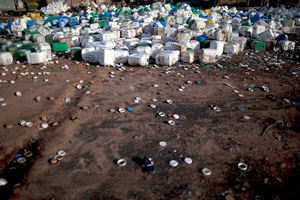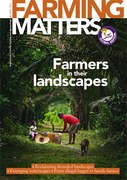Landscapes are rich melting pots of biological and cultural diversity which, in many cases, are under threat. Here, from across the globe, we see four examples of farming communities taking initiatives to resist the destruction of their environment, assert their rights and improve their landscapes.
Argentina: Implementing the constitution now!

In July 2014, social organisations in the province of Entre Rios in Argentina began legal action before the court of justice. They are demanding the implementation of the 2008 provincial constitution, which proposes a groundbreaking transition toward sustainability. In particular, it defends small scale producers and promotes sustainable production, trade and consumption, while discouraging latifúndio (large scale land ownership, which is widespread in the region). This is particularly significant in Entre Rios, where genetically modified soybeans are produced on 70% of the territory.
Six years after establishing the constitution, nothing has happened. So in collaboration with the university and farmer organisations, the M’Biguá Foundation has requested regulatory legislation. This would mean the promotion of agroecological belts around cities, establishing access to safe drinking water as a human right, protection of the soil, and the promotion of diverse and sustainable production.
One crucial element in the constitution is the formation of an Economic and Social Council with participation of farmers. “The new constitution is unique as it protects our rivers, soils and right to water. Turning it into law will signify a major policy change, including greater social participation in territorial planning” says Jorge Daneri of M’Biguá.
More information: Contact the M’Biguá Foundation (mbigua@mbigua.org.ar)
Australia: Lock the gate for fracking

More than half of Australia is covered by coal or gas licenses and the recent corporate interest in unconventional gas extraction (using a process known as ‘fracking’) is threatening farmland, ground water and native vegetation on a large scale.
The rate of expansion of coal seam gas wells in Eastern Australia has been incredible and it is estimated that 40,000 new wells may be drilled in the coming decade.
Lock the Gate Alliance, a national coalition, has proven hugely successful in hampering the unprecedented push to drill holes in the landscape. Companies have been forced to pull out of existing projects. One recent win was in the Northern Rivers region of the state of New South Wales where months of direct action by local community members resulted in a suspended mining license and local councils declaring their lands to be fracking free.
Success of the continuing campaign highlights the power of new alliances between farmers and environmentalists who share a commitment to protect the fabric of rural Australia. The campaign started with landowners locking their gates but has grown to encompass entire communities taking action and building the power needed to protect their landscapes.
More information: Contact the Lock the Gate Alliance (info@lockthegate.org.au)
Brazil: Mate-scapes
Yerba mate (pronounced ‘mah-te’) is a plant used for making a traditional ‘tea’ in South America, and increasingly marketed worldwide. The shrub (Ilex paraguariensis) produces caffeine-rich leaves with medicinal properties when taken as an infusion. Less well known, however, are its benefits in conserving biologically rich landscapes. In Brazil alone, mate is grown on 700,000 hectares, although 57% of national production is still collected from native forests.
In the Planalto Norte Catarinese, Santa Catarina, pasture, forests and yerba mate co-exist as a mutually supporting agroecosystem. However, this is threatened by the artificial distinction between ‘landscapes of production’ and ‘landscapes of conservation’ that exists in the minds of experts and policy makers. Researchers and extensionists promote industrial monocropping of yerba mate with agrochemicals.
Wild collection is disregarded as something primitive, and is seen as contrary to conservation goals by many ecologists and forestry technicians. Legislation is threatening to put severe restrictions on the management of these forests, making the easiest option being to convert these forests to agriculture. But farmers in the Planalto Norte Catarinese are hesitant, knowing the benefits they gain from wild yerba mate, construction timber and firewood. This mosaic of natural forest, yerba mate fields and cattle pastures, creates a unique landscape where biodiversity conservation and family farming combine. And in Santa Catarina, farmers are ensuring this continues to be possible.
More information: Contact Anésio da Cunha Marques, environmental analyst at the Instituto Chico Mendes de Conservação da Biodiversidade; Valdir Frigo Denardin, professor at the Universidade Federal do Parana; or Mauricio Sedrez dos Reis, professor at the Universidade Federal de Santa Catarina.
Mexico: Defending landscapes – Mayan peasants
A small group of beekeepers caused a major problem for the multinational Monsanto company when on the 7th of August 2013, a court in the state of Yucatán cancelled permission to the company for the commercial planting of genetically modified (GM) soyabeans. The reasons were that this would have had harmful effects on beekeeping by indigenous Mayan peoples and family farmers in the region. This legal victory halts the planting of 253,500 hectares of GM soybeans in seven states in Mexico, protecting about 30 thousand indigenous farming families. Community based organisations under the umbrella name of Acción Colectiva filed a lawsuit when the permit was granted, and protests came from thousands of Mayan farmers and beekeepers, Greenpeace, the Mexican National Commission for the Knowledge and Use of Biodiversity, the National Commission of Natural Protected Areas and the National Institute of Ecology.
The First District Court of Yucatán said that co-existence between honey production and GM soyabeans is not possible. The permit was also revoked because it was granted without consultation, being a direct violation of the rights of the communities for adequate consultation. In addition, the court found that there is also a risk of contamination of other crops in the region from using GM seeds.
More information: Contact the Seeds of Life Foundation/ Acción Colectiva, Mexico (contacto@semillasdevida.org.mx)

